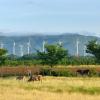
Options Winter 2020: IIASA researchers explored the effectiveness of social impact assessments in overcoming local opposition to the implementation of renewable energy projects.
Policymakers worldwide are realizing the benefits of renewable energy, but many, particularly in the Global South, are finding it difficult to overcome local opposition despite widespread social impact assessments (SIAs).
This opposition is caused by concerns about the social, aesthetic, and environmental impacts of renewable energy projects and can lead to the delay and cancellation of many projects.
While Mexico is becoming a global leader in renewable energy, fierce opposition, especially because of landuse rights, has resulted in the re-discussion of existing SIA procedures in terms of their benefits, costs, and risks for local communities.
Research conducted by Nain Martinez, a doctoral student at the University of California, Berkeley in collaboration with IIASA colleagues, revealed several issues related to the regulatory and institutional design of SIAs and practices. It concluded that low involvement of local communities and civil society negatively affect the comprehensiveness of SIAs and the implementation of social management plants.
“This research was based on extensive dialogue with various stakeholders involved in energy policy development and its implementation in Mexico. The results show there is little agreement on an institutional and regulatory framework for deployment of renewable energy sources such as SIAs,” says IIASA researcher Nadejda Komendantova. “Therefore, participatory governance is needed to develop compromise-oriented policy solutions and to include a variety of views.”
The findings aim to inform governments and activists about required reforms to improve the management of social impacts and the relationship between projects and local communities in Mexico and elsewhere.
By Michael Fitzpatrick
